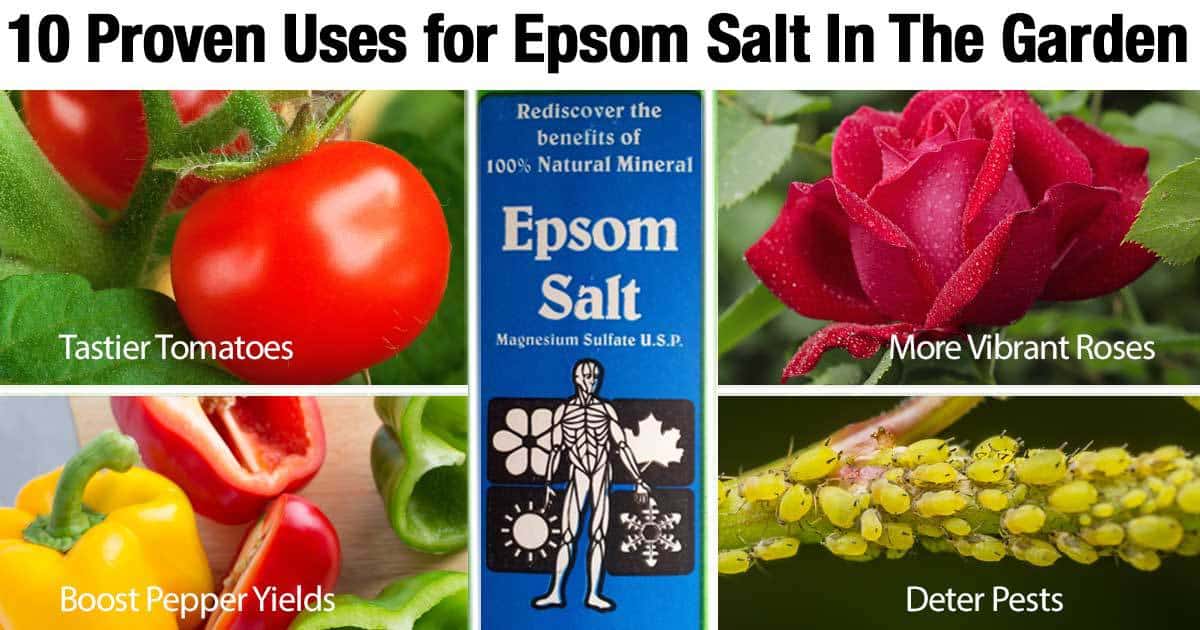For The Keen Gardeners
Useful facts for maximum growth in your garden.
Epsom salt has long been a favorite for many gardeners and for some it is a best friend. With the push towards more “green living” and organic gardening, Epsom salt has been growing in popularity. Epsom salt makes for an ideal answer to a variety of organic gardening needs. Cost-effective, affordable, easy on your plants.
It can help:

Epsom Salts are a safe and natural product to have at home for many health and beauty uses. In fact, it should be an essential item in every household to provide natural and frugal benefits.
However, today we will focus on the unique Uses for Epsom Salt in the garden. First, let’s look at what Epsom Salt is
Epsom Salt is a mineral compound of magnesium and sulfate in crystal form – “magnesium sulfate”, which I’ve used on plants for 40+ years. It is sourced from the bitter, salty spring of Epsom in Surrey, England.
Surprisingly, it isn’t actually salt but a naturally occurring mineral compound of sulfate and magnesium. It derived its name from the spring where it is sourced from. It doesn’t have sodium chloride like in table salt
.
Now, let’s look at some of the uses for Epsom Salt in the garden.
Magnesium helps in seed germination by aiding to strengthen cell walls. This leads to an increase in germination percentage and stronger seedlings.
For best results, when planting directly in the garden, use 1 cup of Epsom salt per 100 square feet or plowed soil. You can also mix one to two tablespoons of salt in each hole before dropping in the seeds. Read how to use Epsom salt when starting seeds in small containers.
 This makes the plant demand a doubled amount of magnesium levels than
other plants. Tomato vines are also prone to calcium deficiency, and
that’s why most tomato fertilizer is calcium-rich.
This makes the plant demand a doubled amount of magnesium levels than
other plants. Tomato vines are also prone to calcium deficiency, and
that’s why most tomato fertilizer is calcium-rich.
This makes both (magnesium and calcium) compete for root absorption.
Useful facts for maximum growth in your garden.
Epsom salt has long been a favorite for many gardeners and for some it is a best friend. With the push towards more “green living” and organic gardening, Epsom salt has been growing in popularity. Epsom salt makes for an ideal answer to a variety of organic gardening needs. Cost-effective, affordable, easy on your plants.
It can help:
- Grow the best-tasting tomatoes and peppers and improve vegetables overall.
- More vibrant flower color – Roses love it!
- Help in germination of seeds
- Reduce transplanting shock
- Even help in stump removal

Epsom Salts are a safe and natural product to have at home for many health and beauty uses. In fact, it should be an essential item in every household to provide natural and frugal benefits.
However, today we will focus on the unique Uses for Epsom Salt in the garden. First, let’s look at what Epsom Salt is
Epsom Salt is a mineral compound of magnesium and sulfate in crystal form – “magnesium sulfate”, which I’ve used on plants for 40+ years. It is sourced from the bitter, salty spring of Epsom in Surrey, England.
Surprisingly, it isn’t actually salt but a naturally occurring mineral compound of sulfate and magnesium. It derived its name from the spring where it is sourced from. It doesn’t have sodium chloride like in table salt
.
Now, let’s look at some of the uses for Epsom Salt in the garden.
Epsom Salts Aids In Seed Germination
You can add Epsom salt for plants as an amendment before sowing seeds for your garden. This can give your plants a dominant boost right from the start.Magnesium helps in seed germination by aiding to strengthen cell walls. This leads to an increase in germination percentage and stronger seedlings.
For best results, when planting directly in the garden, use 1 cup of Epsom salt per 100 square feet or plowed soil. You can also mix one to two tablespoons of salt in each hole before dropping in the seeds. Read how to use Epsom salt when starting seeds in small containers.
Tastier Tomatoes
Tomato plants are popular garden residents and have fruits weight exceeding the plant size, leading to much higher chances of magnesium deficiency.Related Reading
Gardeners Secret Weapon – Epsom Salt For Sweeter Tomatoes
This makes both (magnesium and calcium) compete for root absorption.
No comments:
Post a Comment